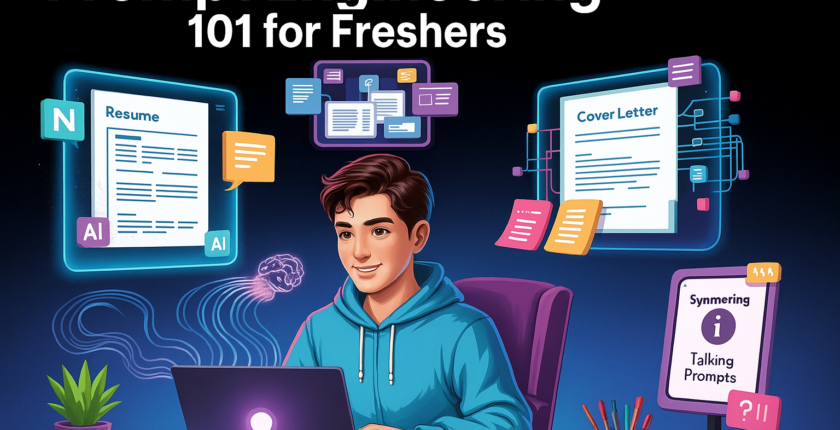Prompt Engineering for Freshers : Talk to AI Like a Pro
Prompt Engineering for Freshers: Talk to AI Like a Pro : For students, new hires, and working professionals, artificial intelligence (AI) is now more than just a trendy term. AI tools like ChatGPT, Google Gemini, and Microsoft Copilot are revolutionizing the way we work and learn, from creating resumes to resolving coding issues. The catch is that the intelligence of these tools depends on how you communicate with them. Prompt engineering can help with that.
The art of prompt engineering involves asking the right questions and providing AI tools with the right instructions. It’s a game-changer for new hires because knowing how to create the ideal prompt can save time and yield better results whether you’re learning new skills, practicing coding, creating a resume, or getting ready for a job interview. This post is your comprehensive introduction to prompt engineering, covering its definition, importance, and useful tactics you can put to use right now.
What is Prompt Engineering?
Prompt Engineering is The process of creating and organizing prompts (questions or instructions) so that AI tools can provide precise, pertinent, and excellent answers is known as prompt engineering. A well-crafted prompt would be, “Write a professional cover letter for a fresher applying for a Java developer role at Infosys, highlighting problem-solving skills and academic projects in AI,” as opposed to typing generic requests like “Write a cover letter.”
Gaining proficiency in prompt engineering enables new hires to use AI for learning, job searching, career advancement, and interview preparation. Giving AI tools precise instructions is like giving them a roadmap because they function as “assistants” and will always produce better results.
Why Prompt Engineering Matters for Freshers
Every advantage counts for freshmen and students entering the cutthroat job market. Candidates must now be AI-aware, if not AI-skilled, according to recruiters. Prompt engineering demonstrates your digital intelligence and readiness for the workplace of the future.
AI tools can also assist with skill learning, portfolio creation, LinkedIn optimization, resume building, and practice interviews. But the output will stay generic unless you provide structured prompts. You can use AI as a career assistant, tutor, and personal coach if you have strong prompt engineering skills.
🛑Start and Master Prompt Engineer now 🛑
Key Strategies in Prompt Engineering for Freshers
1. Be Specific, Not Generic
A vague prompt gives vague results. The more specific you are, the better the outcome.
Instead of typing “Help me prepare for interviews”, write:
“Give me 10 common interview questions for a fresher applying for a software developer role in TCS, along with sample answers that highlight communication skills and teamwork.”
Specific prompts give focused results that can actually help in real-world scenarios like job interviews. For freshers, this saves hours of manual preparation.
2. Use Role-Based Prompts
AI responds better when you assign it a role.
For example:
“You are an HR recruiter. Conduct a mock interview for a fresher applying to Wipro for a data analyst position. Ask me 5 technical and 5 HR questions.”
Role-based prompts simulate real-world situations, making your preparation far more effective than just reading generic questions.
3. Break Complex Tasks into Steps
Instead of asking for everything in one go, break your prompt into stages.
For example:
- Step 1: “Give me a resume outline for a fresher in mechanical engineering.”
- Step 2: “Now fill the outline with strong points for projects and internships.”
- Step 3: “Rewrite the resume in an ATS-friendly format.”
This structured approach ensures better and more polished outputs.
AI tools for beginners : From ChatGPT to Copilot Everyday AI Tools Freshers Can Master
4. Give Examples for Context
AI loves examples. By showing a sample, you set the right context.
Example prompt:
“Here’s my sample LinkedIn ‘About’ section: [paste text]. Rewrite it to sound more professional, add 2 achievements, and make it SEO-friendly with keywords like fresher, Java developer, and problem-solving skills.”
This technique is highly effective for resumes, cover letters, or even email drafting.
5. Refine with Iteration
Prompt engineering is not about typing once—it’s about refining.
For example:
- First prompt: “Write a cover letter for a fresher.”
- Follow-up prompt: “Make it shorter, more formal, and highlight teamwork skills.”
This iterative refining process helps you craft exactly what you need.
6. Use AI Tools for Different Needs
Prompt engineering is not limited to ChatGPT. Freshers can use it across tools:
- ChatGPT / Google Gemini → for learning, interview practice, resume tips.
- Microsoft Copilot → for coding help, productivity, and documentation.
- CoverDoc AI → for AI-powered cover letters.
- Novorésumé → for smart, ATS-friendly resumes.
Each tool becomes more powerful when you apply prompt engineering techniques.
How to Use Nano Banana AI – A Beginner’s Guide
7. SEO and Keyword Awareness
Even while writing resumes or LinkedIn profiles, you can use prompt engineering to make your content keyword-rich.
Example:
“Rewrite my LinkedIn headline to include keywords: fresher, Python developer, AI enthusiast, problem-solving, and entry-level IT jobs.”
This improves your visibility in recruiter searches—an underrated but powerful use case for prompt engineering
5 AI Tools to Practice Prompt Engineering
| ChatGPT | Ideal for quick fixes, practice interviews, and general learning. |
| Google Gemini | Excellent for conducting research, generating ideas, and rapidly grasping concepts. |
| Microsoft Copilot | Ideal for technical documentation and coding assistance. |
| CoverDoc AI | Tailor-made for generating personalized cover letters. |
| Novorésumé | Combine prompts with templates to get the best fresher resume. |
Conclusion
Not only is prompt engineering a technical skill, but it’s also a career survival skill for 2025 and beyond. Freshmen can learn more quickly than their peers, improve their resumes, and prepare for interviews more intelligently if they can “talk to AI like a pro.” Knowing how to design prompts can help you stand out in today’s cutthroat job market, where employers are also using AI for screening.
Start practicing now, try different prompts, improve them, and use AI to further your career. Those who can ask the right questions will rule the future, and freshmen who become adept at this will always be one step ahead.



